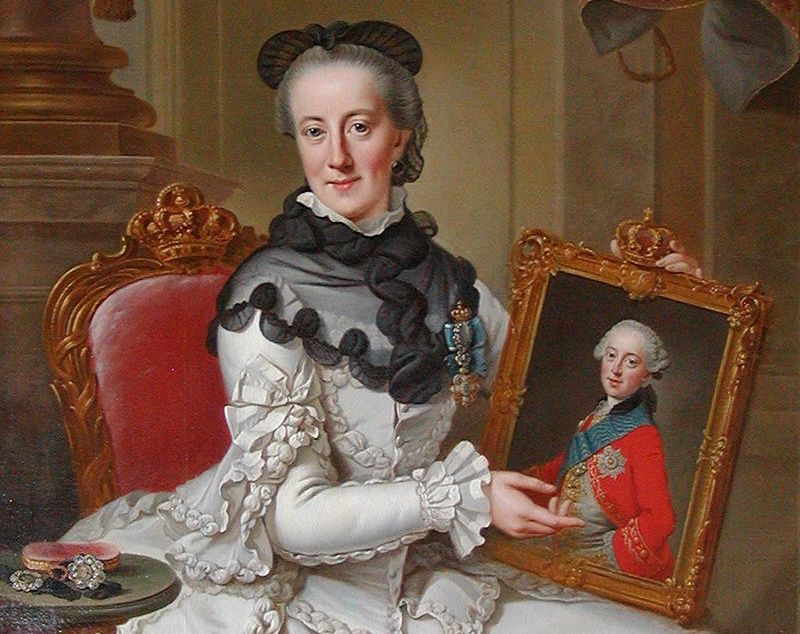At Copenhagen’s State Hospital, known to Danes as Rigshospital or sometimes just ‘Riget’, the maternity ward, special babies unit and infertility clinic of the Juliane Marie Centre has been the first port of call for millions of newborn babies over the last 250 years, from illegitimate commoners to royalty. However, for many of these parents, the name of the centre may well be a complete mystery.
Juliane Marie became queen of Denmark at the age of 22 when she married King Frederik V in 1752. The marriage was planned by the king’s ministers just one year after the previous queen, the tremendously popular Louise, had passed away, and the royal council had hoped that the marriage would do something to abate the king’s binges and adulterous escapades.
The strictly brought-up Juliane Marie did not quite make the impact the ministers had hoped for; she could not live up to the expectations of her predecessor, was timid and introvert, and she even stammered a little.
Old school House of Cards
Upon her husband’s death in 1766, all that changed. This timid wife became the dowager queen, and her political ambitions suddenly awoke. She played a crucial role in the melodrama surrounding her son Frederik’s ascension to the throne in 1784 and the abdication of her mentally-ill stepson Christian VII – a coup involving herself, Christian’s personal physician Johann Friedrich Struensee and Christian’s wife and Struensee’s lover, Caroline Mathilde. Fans of Mads Mikkelsen will of course be familiar with this tale, as it was the subject of a recent film, ‘A Royal Affair’.
In the decade prior to Frederik VI’s reign, Juliane Marie effectively ruled the country, together with a number of unscrupulous ministers and the physician Struensee, in everything but name. Among the projects begun in her lifetime was the establishment of the world-renowned Royal Danish Porcelain and the setting up of a birthing clinic at the newly built Frederik’s Hospital on Bredgade.
Birth of anonymous clinic
This birthing clinic, which was known in Danish as ‘fødselstiftelsen’, was started in 1750 at the home of Inge Pedersen on Gothersgade. It had the simple aim to an institution where unmarried women could give birth anonymously without giving either their name or the father’s personal details over to the authorities. It was known in that time simply as ‘the midwifery house’ or ‘the birthing house’.
When Pedersen died in 1759, the birthing house was moved to Frederik’s Hospital, which had been established on Bredgade just three years earlier. Frederik V had built the hospital as an independent institution in the Frederikstad district. It was the first hospital in the country to hire trained doctors.
Prior to this, hospitals had been more like poorhouses, or what we would now call hospices. At Frederik’s Hospital, only patients who had a chance of being healed could be admitted to one of the institution’s 300 beds. After the establishment of the State Hospital in 1910, Frederik’s Hospital became an art college, and it is now the Museum of Art & Design.
A new bun in the oven
In 1782 Dowager Queen Juliane Marie purchased the nearby premises of Amaliegade Street 25, close to the royal palace, which had been built by royal architect Lauritz de Thurah in the years 1755-1757. This was to be used for the birthing clinic, which had now outgrown its premises within Frederik’s Hospital. The following year planning permission was granted on the neighbouring grounds, and in 1787 an extension was completed and the clinic moved in.
While the birthing clinic was still at Frederik’s Hospital, Struensee ordered a box to be set outside one of the basement windows where babies born outside of marriage could be left in the hope that this would prevent desperate mothers from killing their offspring. After three years of being ‘misused’ this box was removed.
The idea, remained, however, and was reinstated at the new premises on Amaliegade. Rumour has it that poor single mothers would first mark their babies, leave them in the opening at Amaliegade 25 and then return a couple of days later and volunteer themselves as foster parents – a position that paid a little. They would then take their own baby along with the money as recompense for their ‘good’ deeds.
In 1803, the clinic was extended into Amaliegade 23, formerly a bakery. At first this was used as the nurses’ residence, and then later as patient wards. Following the move to the state hospital on Blegdamsvej Road in 1910, the building was used briefly to intern a detachment of Russian marines, before being handed over to the Interior Ministry in 1922. Today, it is the home of the National Social Appeals Board.












